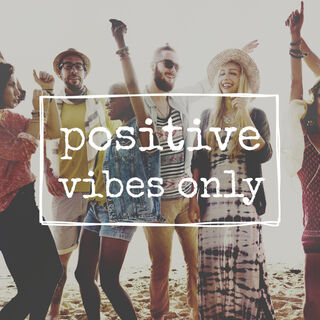Optimism
Why “Toxic Positivity” Isn’t Positivity at All
We should throw the term into the buzzword dump.
Posted December 9, 2022 Reviewed by Tyler Woods
Key points
- “Toxic positivity” is not a toxic level of authentic positive emotions. It is emotional avoidance and invalidation.
- Authentic positivity never denies reality.
- You can acknowledge your very real pain and simultaneously experience genuine positive emotions like love, inspiration, and hope.
- Positivity isn’t glib, it’s the leavening agent of our flourishing and requires deliberate effort and emotional adulthood.
“Good vibes only.” “Everything happens for a reason.” “Just think positive.” And let’s not forget the infamous, “Live, laugh, love!”
Scroll through your Instagram feed or browse through the tote bags, pillows, or coffee mugs at your local gift shop and you’ll see a barrage of positive messages like these.

They seem cheery, but do these messages help you—or harm you? Can too much positivity actually be toxic? And what does the term “toxic positivity” even mean?
Let’s dig into the science of positivity—and debunk a few myths.
What Is Toxic Positivity?
Toxic positivity is not a clinical term but it has become part of our collective vocabulary. It’s the trendy buzzword of the moment. Psychology Today offers a useful explanation of toxic positivity and defines it as follows:
"Toxic positivity is the act of avoiding, suppressing, or rejecting negative emotions or experiences. This may take the form of denying your own emotions or someone else denying your emotions, insisting on positive thinking instead."
Example: You text your friend and share that it’s been a very hard day. You got overlooked for a promotion that should rightfully be yours. They reply, “Look on the bright side—at least you have a job!” *Blowing a kiss emoji*. Or, “Tomorrow is a new day!” *Sunrise emoji*. End of message. Cheerful? Perhaps. Supportive or helpful? No. This well-meaning friend isn’t really willing to listen or be with you in your time of need.
As a developmental psychologist with extensive training in the field of Positive Psychology, I want to clarify that toxic positivity is not a toxic level of positivity. In fact, it’s not positivity at all. It’s just good old-fashioned emotional avoidance, invalidation, and denial. It’s offering a platitude when connection and empathy are needed because it feels easier to stay at the emotional surface rather than to fully experience difficult feelings.
It's time we collectively throw the term “toxic positivity” onto the linguistic trash pile, because it’s misleading. A platitude is not the expression of genuine positive emotion any more than “eating a nourishing meal” is like “binge-eating twenty-five donuts.”
What Is Authentic Positivity?
Authentic positivity is your ability to find meaning, purpose, joy, amusement, inspiration, gratitude, contentment, interest, awe, love, and hope while committing to the reality of life—the good, the bad, and the horrific.
Real positivity is not saying, “Everything is absolutely fine!” while sipping your pumpkin spice latte as the world crumbles around you. It’s not avoidance, denial, delusion, naivete, or ignorance. It’s not complacency, either.
Authentic positivity sounds more like this: “Everything's not fine. Things are hard right now. Even so, I am still in charge of my life. I can choose how I want to think about this situation and how I want to respond.” It’s finding resilience, bravery, and personal responsibility in moments when conditions are not perfect.
Positivity In the Darkest Times
One of the most powerful examples of positivity comes from Viktor Frankl, the renowned Jewish psychiatrist who survived the Nazi concentration camps and the murder of his wife, mother, father, and brother in the Holocaust. In his book, Man's Search for Meaning, Frankl asserts that our deepest human desire is to find meaning in life—and that if we can find meaning, we can survive just about anything (Frankl, 1985). For Frankl, meaning comes from three sources: purposeful work, loving something or someone fully, and finding courage in the face of hardship and suffering.
Frankl argues that you can choose your attitude towards life no matter what your external circumstances may be. Even when everything has been taken from you, even when suffering in the worst situation imaginable, even when living in absolute hell, you are still free to choose your outlook. You can choose hopelessness, helplessness, pessimism, stuckness, or despair, or you can choose something different.
Frankl calls this “tragic optimism,” which he defines as "an optimism in the face of tragedy and in view of the human potential which at its best always allows for: (1) turning suffering into a human achievement and accomplishment; (2) deriving from guilt the opportunity to change oneself for the better; and (3) deriving from life’s transitoriness an incentive to take responsible action" (Frankl, 1985). Tragic optimism is another way of saying “positivity.” You can acknowledge your very real pain—and experience positive emotions like hope—at the same time. It can be both/and, not one or the other.
The Science of Positivity
A 2008 study found that people who are “high in psychological well-being” are more likely to engage in altruistic behavior, such as volunteering or giving money to charity (Konow & Earley, 2008). Well-doing creates well-being and vice-versa, with strong evidence that the pathway from happiness to giving is the more dominant one (Boenigk & Mayr, 2016). Helping others makes us feel better and people who feel better are more likely to help others.
Furthermore, happiness also leads to greater life success and accomplishment. A 2005 meta-analysis (Lyubomirsky, King, & Diener, 2005) showed that positive affect (a.k.a. positivity) preceded success across multiple life domains. Happiness, it turns out, creates success. As Lyubomirsky, King, and Diener write, “positively valenced moods and emotions lead people to think, feel, and act in ways that promote resource building and involvement with approach goals" (Lyubomirsky, King, & Diener, 2005, p. 804).
Authentic positivity matters! Positive emotions broaden our perspective, fertilize social connections, reduce own-race bias, help us acquire new knowledge and skills, increase creativity and innovation, build trait resilience, and enhance physical health (Fredrickson, 2013). Positive emotions, as Barbara Fredrickson, Ph.D., succinctly puts it, “broaden our mindset and build our resources" (Fredrickson, 2013, p.17).
In short, positivity allows us to flourish even when life is hard—which it invariably is.
How to Cultivate Positivity
If the word “positivity” annoys you and feels excessively perky and peppy, call it something else. Label it “effective thinking,” or, like Frankl, “tragic optimism.” While it’s not always easy to do, you can cultivate positive emotions no matter what is happening in your life.
When you are going through something difficult…
- Remind yourself that you cannot choose your external circumstances, but you can always choose your attitude and your response. (“I can’t control what happened—but I can control what I choose to do about it.”)
- Create meaning even when there seems to be none. (“This event did not happen for a reason. It was random, chaotic, and senseless. However, I can find a way to turn this mess into something of value—by helping others, by giving back, or by improving myself personally. I can turn my pain into purpose.”)
When someone you love is going through a difficult time…
- Avoid hollow platitudes like, “Look on the bright side!” or, “It’s not a big deal, all things considered!” By doing this, you’re dismissing their pain. Instead, offer greater emotional maturity and try saying, “That sounds really hard. What can I do to support you right now?” Or, “I’m free on Sunday afternoon. May I come over to your place and help you with [specific thing]?” Or, “You don’t have to figure this out alone. We will get through this together.”
Positivity Is the Ultimate Act of Courage
By cultivating a positive outlook, you’re choosing to flourish in a world where—let’s face it—the only certainty is that you and everyone you love will die. Positivity isn’t glib or naive. It’s valiant. It’s the ultimate act of courage. There is no such thing as a “toxic amount” of authentic positivity. In my professional opinion, we are in far less danger of harming ourselves with positivity than we are of not prioritizing it enough.
References
Frankl, V. E. (1985). Man's search for meaning. Simon and Schuster.
Fredrickson, B. L. (2013). Positive emotions broaden and build. In Advances in experimental social psychology (Vol. 47, pp. 1-53). Academic Press.
Konow, J., & Earley, J. (2008). The hedonistic paradox: is homo economicus happier?. Journal of public Economics, 92(1-2), 1-33.
Lyubomirsky, S. L, King and E. Diener (2005b). The benefits of frequent positive affect. Psychological Bulletin, 131(6), 803-855. doi: 10.1037/0033-2909.131.6.803.




